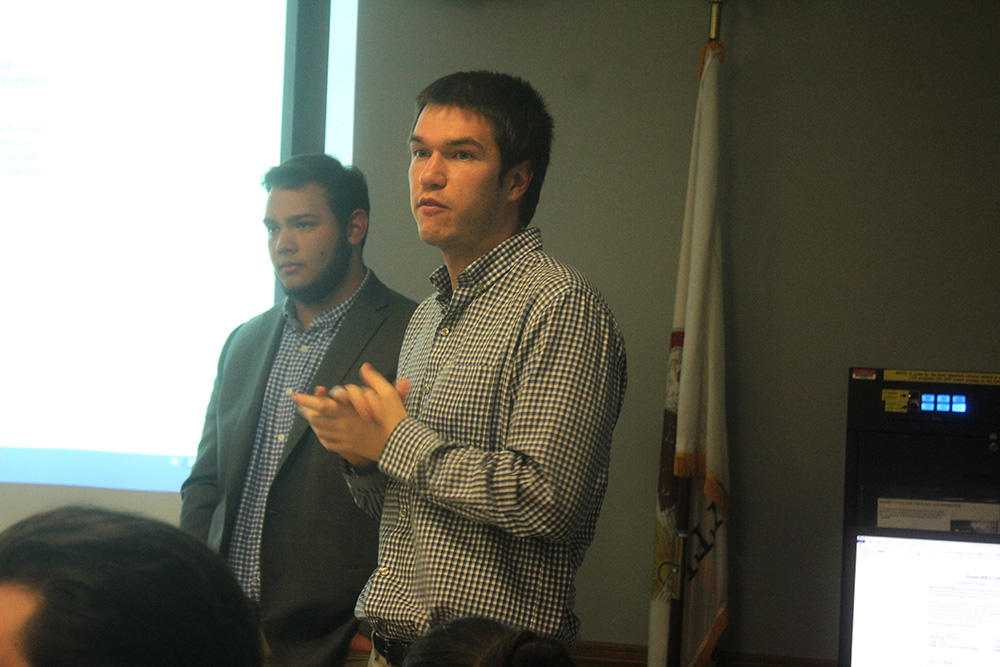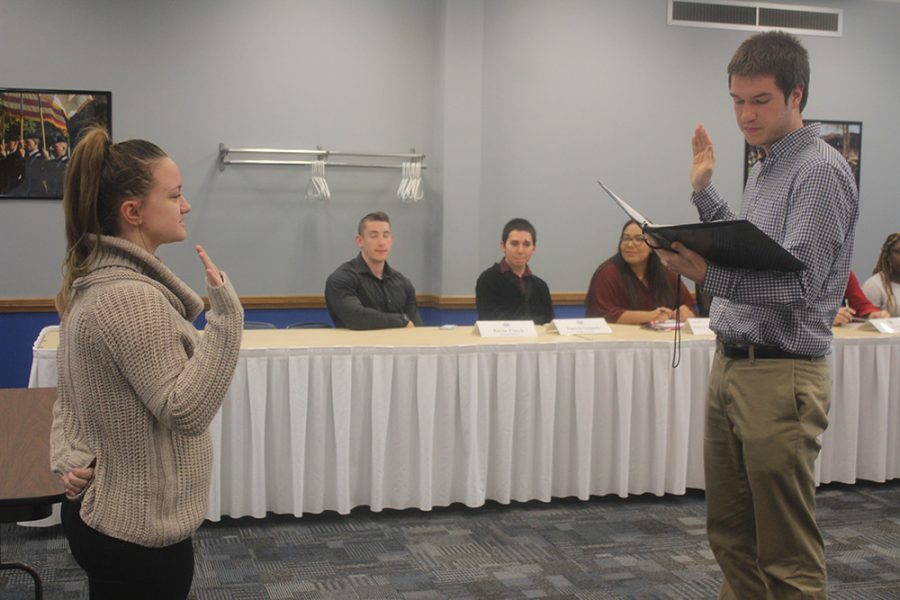Additional funds for panther statue, University Board
Maddie Tate, a freshman early childhood education major is appointed into Student Senate by the Student Body President Luke Young, at a meeting in the Arcola/Tuscola room of the Martin Luther King Jr. University Union on Wednesday evening.
March 22, 2018
Additional funds for a new panther statue and the University Board were approved by the Student Senate Wednesday night.
In the first bill, the student government asked for an additional allocation of $8,363 from the Apportionment Board to help pay for the base, pad, brick work, labor and other materials for the recently-approved statue.
The second was for the University Board, and asked for an additional allocation of $13,600 to pay for the PantherStock event that takes place before the spring concert, purchase a new lighting board for the UB productions committee, clean the tents the UB uses and replace the ropes used to hold down those tents.
The additional allocations come from the Apportionment Board’s reserve fund, which is currently sitting at $117,543.19.

Zach Cohen, the Student Vice President of Student Affairs and Luke Young, the Student Body President
Zac Cohen, the student vice president of student affairs, said during a March 1 meeting that the reserve fund is made up of student activity fee money that was left over from the student government, UB and Student Recreation Center’s budgets over the years.
The funds in both bills have already been approved by the Apportionment Board and will be sent to interim vice president for student affairs Lynette Drake, who makes the final decision.
A bill proposing constitutional revisions and a bylaw change were introduced to the Senate.
Cohen said the constitutional revisions were needed because the last time it was revised was in the fall of 2014.
After speaking with the student government graduate adviser he said there were several line items that the senate did not do anymore.
“We realized this was something we needed to change,” Cohen said. “That’s also why we decided we wanted to do job descriptions (as a separate document from the constitution) for the executive branch positions so that when people come in they have an idea on (what they have to do).”
Cohen said of the over 20 revisions, the one that stood out the most was a change to the maximum and minimum number of seats on senate to make it reflect the actual number of students enrolled.
Cohen said the maximum number of seats is 30 but said that number reflects a higher enrolled population of students. He said the student government spends so much time on ensuring that they have 30 seats even though enrollment is down that they cannot find the time to do other things.
Now, he said one senate seat represents 300 students and the minimum seats that can be in the senate is 18.
He said the senate cannot have less than 18 because then they will not be fully representing students on campus.
Cohen said all the changes are a way to optimize the effectiveness of student government.
Student Speaker of the Senate Will Outzen introduced a bylaw change which calls for adding the course of action to take in case a senator who was appointed could not finish their appointment on senate because of valid reasons.
Outzen said the change is a way to clear the gray area in the appointment process and recalled a situation last semester that involved an appointed senator who did not have the chance to finish the semester he was appointed because of a personal injury.
Cohen said the change proposes that given a special circumstance regarding a senator who is unable to serve one semester but wants to serve during the second, that the Senate can take a vote on whether or not the person can serve instead of the speaker and the executive board making the decision or guessing what they should do.
Cohen said first, it would go to the speaker and if the speaker approves it he would write a written justification as to why the senator should allowed to serve a second appointment Then they make the case to the senate which will then pass or deny the vote.
“We want it to be a valid excuse that the senate agrees on and we’re trying to make it so that we know how to react in case something like this happens,” Cohen said.
The two bills were tabled and will be voted on at the next Student Senate meeting on March 28.
Analicia Haynes can be reached at 581-2812 or [email protected].





















































